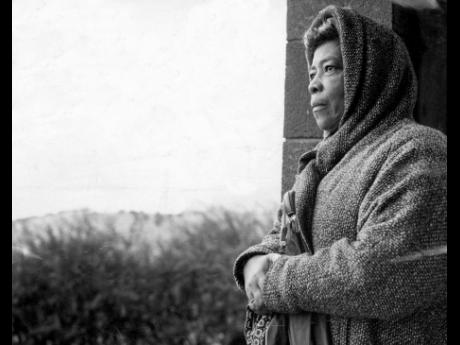Una Marson makes history at the BBC
Part 1 of this article was published last Friday.
Una Marson returned to England and made history as the first black and first West Indian woman employed as a programme assistant on the BBC’s Empire Service. Promoted to work with the famous English writer George Orwell on a series called Voice, Marson transformed the programme into Calling the West Indies, which allowed Caribbean servicemen to send greetings back home.
Soon, however, she devised her own poetry programme, Caribbean Voices, which became one of “the most fruitful enterprises” for promoting Caribbean culture. Literary giants like George Lamming, V.S. Naipaul, and Samuel Selvon were among the many authors who made use of the show.
Returning to Jamaica on sick leave from the BBC, Marson missed a meeting with her penpal friend, renowned American poet Langston Hughes, when he visited the island in 1947. However, in good health again a couple of years later, Marson became the general editor of The Gleaner Company’s book publishing arm, The Pioneer Press.
This position enabled her to bring out inexpensive works of Jamaican authors, including some of Marson’s own poems, which she had contributed to Louise Bennett’s Anancy Stories and Dialect Verse. Marson’s free time was devoted to helping upcoming writers – one, Andrew Salkey – and to the Readers and Writers Club she had set up years before.
CHALLENGING STATUS QUOS
Marson again left Jamaica, this time for the United States, where she spent eight years, and had a brief marriage. Returning in 1962, in time for the Independence celebrations, Marson got involved with the Rastafarian community, her support for which, writes Tomlinson, was possibly “one of the most courageous steps” of her career, given the “brutal attacks and discrimination the group faced”.
She was not afraid “to criticise intellectuals she thought too scholarly in their approach and not proactive or practical,” and, she, herself, very practically established the Foreshore Road Infant Centre for Rastafarian Children.
Her first play, At What a Price (1932), was co-authored with Horace Vaz, and had its world premiere at the Ward Theatre, Kingston. Later it was staged in London’s West End, becoming the first black colonial production in that eminent theatre district. Marson was congratulated as a pioneer in her use of Jamaican themes, characters and settings in the play, and an article in The Daily Gleaner of June 13, 1932, called for “more such productions and greater support for local writers”.
Marson’s second play, London Calling (1937), a comedy in which Marson touches on “the serious political climate of the time”, has been in the news recently. This email was sent to me in mid-October:
“In collaboration with the National Theatre’s black Plays Archive, the online catalogue for the first professional production of every African, Caribbean and Black British play produced in Britain, we present the inaugurating evening of Re-VIEW, the first of a series of staged readings of excerpts of plays by black authors of past decades.
“These plays speak of important themes seen from a black perspective. They were all staged to great acclaim at the time they were written and they must not be forgotten. It is our privilege at Draper Hall [Hampton Street, London] to host the inaugurating evening (October 31) of this initiative in our offers for Black History Month 2019.
“The evening will see extracts from Skyvers by Barry Reckord [another Jamaican theatre pioneer], which was first produced in 1963 at the Royal Court, London, and London Calling by Una Marson (1938), one of Jamaica’s most important feminists and dramatists … .”
Another Marson-related email brought the news that, launched this week was a podcast, New Caribbean Voices, hosted by Malika Booker, which will explore contemporary Caribbean and black British writing, and is a spiritual successor to the BBC’s Caribbean Voices show. It is being produced by Melody Triumph for the Caribbean-friendly Peepal Tree Press.
Marson’s last play, Pocomania, Tomlinson writes, is “filled with the celebration of African drums, dance, worship and Jamaican Patwa” and was “ a milestone in the development of a national Jamaican theatre”. It was first staged at the Ward Theatre and got a favourable reception from the general public, including Philip Sherlock, and reviewers. In 1940, it was seen by a “sympathetic” audience in Lagos, Nigeria.
Summing up Marson’s work as a feminist, Tomlinson writes: “Marson was a pioneer in illustrating how the intersections of race, gender and class contributed to the oppression that dominated the lives of African working-class women in colonial Jamaica.”
And in her concluding paragraph, Tomlinson states that while Marson’s early writing revealed “her insecurities and the colonial education that affected her craft and tainted how she saw herself as a black woman”, her later work “demonstrated how she challenged the social expectations of what women should and could write”.
As our talk drew to a close, Tomlinson opined to me that Marson deserves a major national honour. Una Marson is available online at Amazon, and at the UWI Press, Mona.

